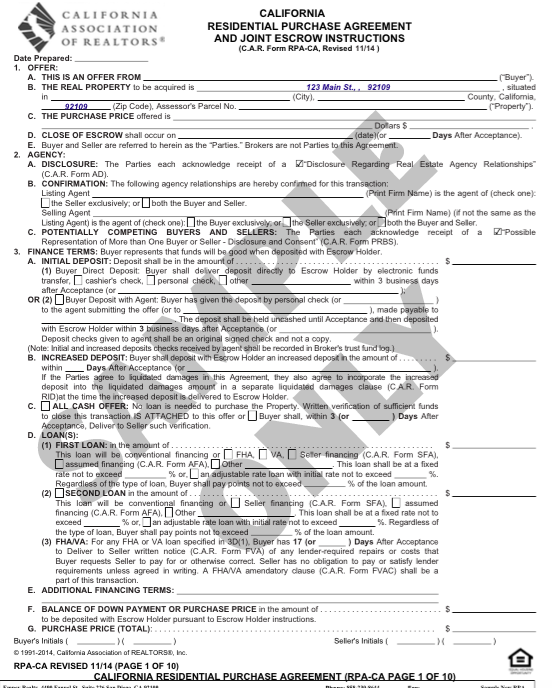
In the last installment of our blog series on How to Buy a Home in California, we talked about some of the basics—how the MLS works, and what is fair market value. In this post we'll be going over basics about the standard home purchase contract in California, so you'll have a general idea of what you're getting into. We'll of course be going into more detail on this contract when we talk about writing offers and getting through escrow. If you want to browse through the topics in this series, please use our handy Table of Contents.
More...
What Do You Mean, Standard Contract?

In California, when you hire a Realtor to help you buy or sell a home, they will use a standard form purchase contract for that transaction. You see, Realtors are not attorneys (at least not most of them), and they're not licensed to practice law, so the California Association of Realtors has their atttorneys draft these standard form agreements for Realtors and their clients to use. The contract is very good actually, and it's very complex. It’s 10 pages long, 31 paragraphs, and some of those paragraphs have up to 12 sub-parts. That's a lot of boxes to check and blank spaces to fill in with terms that either work for you or against you. We've included page 1 here as a sample. Bottom line, make sure you have a great agent representing you, with expertise in this contract.
The contract was actually recently completely overhauled in November 2014, so it's a good opportunity to quiz potential Realtors and make sure they are on top of these important changes. For a list of 7 interview question to ask before you hire a Realtor, click here.
All Home Sales in California are "As-Is"
There is a common misperception about this, as many people don't realize that every home sold in California, by the standard terms of the contract, is sold "as-is." The way the contract is written, it gives the buyer a lot of opportunities to cancel the contract without penalty. So in practice, sometimes for the sake of keeping the deal together, sellers agree to change the contract and do repairs or give the buyers a price break if some major defect with the home is discovered during the buyer's due diligence. But keep in mind that that seller does not have to agree to these changes in the contract, at which point the buyer's remedy would be to walk away.
There is also a duty of good faith and fair dealing in every contract in California. Buyers should understand that they're purchasing the home "as-is," and factor that into their offer price, rather than offering more with the idea that they'll renegotiate the contract during escrow. When you purchase a used home, your home inspector is going to identify maintenance items that need to be addressed. These are called "pride of ownership" items, like a new flap on your dryer vent, a new flex line under your sink because it's supposed to be flex, not rigid, etc. These are the handyman items and weekend Home Depot trips that go hand-in-hand with being a homeowner.
It is not appropriate to come to the seller with a laundry list of these small items after the property inspection and ask the seller to pay for them or give you a discount off the purchase price. Buyers should only ask for a change to the contract when they find something that affects the health and safety of the home, or a major needed repair that was not anticipated at the time the contract was negotiated, i.e, something that would truly cause the buyer to walk away from the deal otherwise.
Keep reading here, at How to Buy a Home In California, Part IV, where we'll be going over what you need to know before you hire a Realtor in California. Please share and leave us any questions or comments below!
